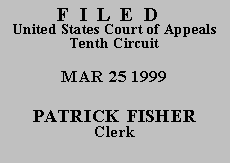

| UNITED STATES OF AMERICA, | |
| Plaintiff-Appellee, | |
| v. | |
| GELACIO ORTIZ-APARICIO, | |
| Defendant-Appellant. |
Defendant pled guilty to illegal reentry of a deported alien in violation of 8 U.S.C. § 1326. He appeals the 77-month sentence imposed by the district court. Believing there to be no meritorious grounds on which Defendant could appeal his sentence, his counsel filed a brief pursuant to Anders v. California, 386 U.S. 738 (1967), and a corresponding motion to withdraw.(1) According to the Anders brief, Defendant contends that his sentence is too long for his particular illegal actions and requests this court to remand for resentencing for a shorter period of incarceration.
At sentencing, the district court made the following calculations. The applicable sentencing guideline for a violation of 8 U.S.C. § 1326 provides that the base offense level for unlawfully entering or remaining in the United States is 8. See U.S.S.G. § 2L1.2. Because Defendant was previously deported after an aggravated felony conviction, the court increased his offense level by 16 levels to 24. See id. § 2L1.2(b)(1)(A). The court then reduced Defendant's offense level by 3 levels for acceptance of responsibility to a total offense level of 21. See id. § 3E1.1. Additionally, based on Defendant's prior offenses, the court found that his criminal history category is VI. See id. § 5A. The guidelines recommend a sentencing range of 77 to 96 months for a criminal history category VI and an offense level of 21. See id.; R., Vol. II at 3-4. In light of these facts, the district court imposed a 77-month sentence which was at the low end of the appropriate guideline range.
"A defendant's right to appeal a sentence imposed by a federal court is governed by 18 U.S.C. § 3742(a)." United States v. Garcia, 919 F.2d 1478, 1479 (10th Cir. 1990). The statute indicates that a defendant may appeal a sentence within the guidelines range if it is imposed in violation of law or as a result of an incorrect application of the guidelines. See 18 U.S.C. § 3742(a)(1)-(2); Garcia, 919 F.2d at 1479. Because Defendant does not contend that his sentence was imposed in violation of the law or as an incorrect application of the sentencing guidelines, and because no argument can be made that the sentence was premised on facial illegality, improper calculations, or clearly erroneous fact findings, see Garcia, 919 F.2d at 1481, we do not have jurisdiction to review his sentence.(2)
Further, even if we construed Defendant's appeal as an argument that the district court should have departed downward from the guideline range, we do not review this claim because he did not raise it at sentencing. See Walker v. Mather (In re Walker), 959 F.2d 894, 896 (10th Cir. 1992). In any event, presuming that the court knew of its authority to depart, see United States v. Nelson, 54 F.3d 1540, 1544 (10th Cir. 1995) (citing United States v. Rodriguez 30 F.3d 1318, 1319 (10th Cir. 1994)), we lack jurisdiction to review this claim. See id. ("A discretionary refusal to depart downward is not reviewable by this court unless it appears from the record [that] the sentencing court erroneously believed the Guidelines did not permit a downward departure.").
Accordingly, we GRANT counsel's motion to withdraw and we DISMISS this appeal for lack of jurisdiction.
Entered for the Court
Monroe G. McKay
Circuit Judge
*. This order and judgment is not binding precedent, except under the doctrines of law of the case, res judicata, and collateral estoppel. The court generally disfavors the citation of orders and judgments; nevertheless, an order and judgment may be cited under the terms and conditions of 10th Cir. R. 36.3.
1.Defendant did not file a brief to supplement counsel's Anders brief.
2.In theory, Defendant could also challenge his 77-month sentence under 18 U.S.C. § 3553(c), which provides that the sentencing court must state why it imposed a sentence at a particular point within a range that exceeds 24 months. However, because the district court sentenced Defendant at the low end of the guideline range in accordance with the plea bargain and pursuant to the government's recommendation, see R., Vol. II at 5-6, such an argument has no merit in this case.